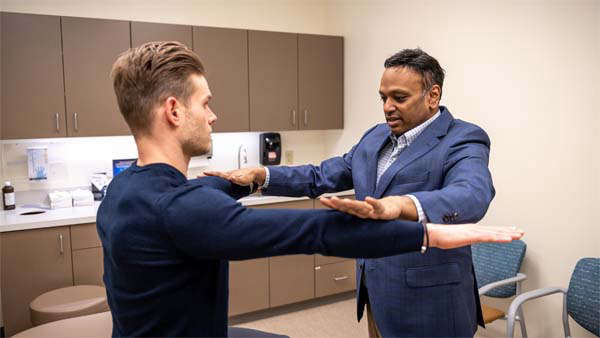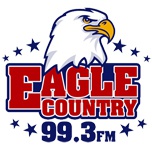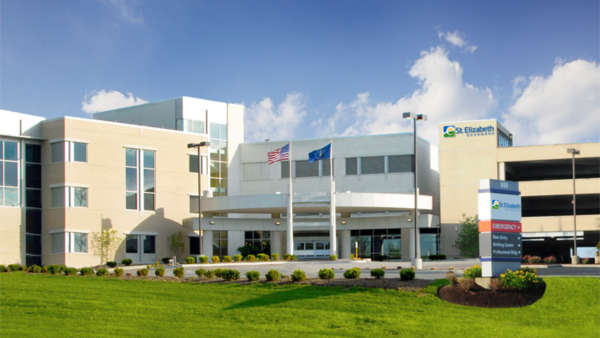According to the CDC, more than 39% of adults experience regular back pain.

Dr. Jaideep Chunduri with patient. Photo provided.
No matter if we are sitting, standing, walking, running or just reaching, our backs are working. Is it any wonder, according to the Centers for Disease Control, that more than 39% of adults experience regular back pain? Some other research says that up to 80% of adults will experience some type of back pain in their lives. Before social-distancing and covid-related absences, surveys even showed that back pain was the second highest cause of sick days off from work (behind the ordinary cold). Luckily, most back pain is self-limiting and resolves with minimal treatment.
So we asked Dr. Jaideep Chunduri, a Board Certified Spine Surgeon at Beacon Orthopaedics & Sports Medicine in Lawrenceburg and Beacon West, what the most common causes of back pain were. Here is his list:
-
Ligament or Muscle Strains or Sprains
These can occur while bending, twisting, stretching or reaching. The pain from these strains and sprains can range from mild to severe. This is usually self-limiting and will usually resolve.
-
Spinal Nerve Compression
Pressure on these nerves may cause pain, numbness and weakness. This pain can occur in the cervical spine (neck to the arms) and the lumbar spine (from the back through the legs) depending on the location and severity of the compression.
-
Herniated Discs
Herniated discs get their name from hernias which occur when an organ pushes through the muscle or tissue that holds it in place. These most commonly occur with the intestines and the abdominal wall. However, sometimes the gel-like fluid in the center of a spinal disc herniates -- pushing through the fibrous outer wall resulting in a large bulge that can press on nearby nerve roots, causing pain. Think of it as the jelly from inside of a jelly donut squirting out. Pain from a herniated disc can occur at the hernia site or in other places like arms or legs.
-
Sciatica
The term sciatica or my sciatic nerve hurts is often used to describe pain in the buttock radiating down the leg. Often, people believe that the problem is from an actual problem with the Sciatic Nerve but the most common cause of this “sciatic type” pain is a compressed nerve in the lower spine.
-
Degenerative Disc Disease
Degenerative disc disease is the culmination of the effects age has on the body and spine. As you age, your body dehydrates. This causes the spaces between discs to narrow, causing changes in height and space available for the nerves. This resulting excess pressure on the spine can cause pain. Just because you have a degenerated disc or herniated disc does not necessarily mean that you have pain.
Even with those statistics and given all the potential causes, back pain is not inevitable. As with all physical activities, stretching before and after a workout is important. Here are some exercises you can do to reduce back pain in the long run:
-
Toe Touches
-
Sit-Ups (on a flexible material – e.g. yoga mat)
-
Hamstring Stretches
-
Leg Lifts
-
Wall Sits
-
Press-Up Back Extensions
-
Knee-to-Chest
-
Pelvic Tilts
Now, if you do injure yourself, be sure to avoid the activities that further stress the spine. Take brief rest periods throughout the day (lying flat on a soft surface), take a short walk or stretch every 20 minutes or so. Apply heat or cold to the problem area to reduce discomfort or swelling and inflammation. Consider using over-the-counter medications that are approved by your physician. Perhaps an anti-inflammatory will help.
However, if your back pain becomes severe or doesn’t improve after two weeks of using these at-home remedies, it may be time to seek medical treatment that is specialized for your situation. “I want to help patients reach their goals,” said Dr. Chunduri. “We talk about what he or she wants to achieve with treatment. And together, we develop the best treatment plan to get there.”
Beacon Orthopaedics treats patients of all ages for various injuries and ailments. You can always schedule a diagnostic appointment at any one of the area Beacon locations. If you get injured, you can readily go to one of their Saturday morning injury clinics or urgent care facilities throughout the area. Go to www.beaconortho.com or call 513-354-3700 to find a nearby Beacon location or to schedule an appointment.

 Local Sports Report - February 24, 2026
Local Sports Report - February 24, 2026
 Norman Named ORVC Boys Basketball Player of the Week
Norman Named ORVC Boys Basketball Player of the Week
 VIDEO: Switz. Co. Team Manager Delivers Magical Moment on Senior Night
VIDEO: Switz. Co. Team Manager Delivers Magical Moment on Senior Night
 IHSAA Boys Basketball State Tournament Begins Next Week
IHSAA Boys Basketball State Tournament Begins Next Week
 Milan's Thomas, OA's King Claim Sectional Titles
Milan's Thomas, OA's King Claim Sectional Titles













